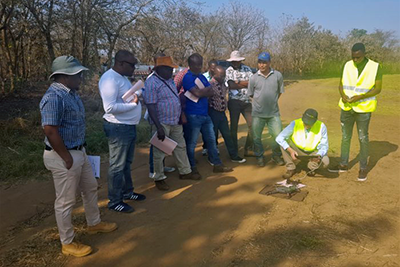The impacts of climate change are being felt daily by farmers worldwide. Irregular rain patterns and increasing droughts are putting the world’s food supply at risk. To best mitigate the increasing impacts of climate change on their production, it is imperative that farmers have access to precise information and cutting-edge tools and technologies on their farms.
In order to help farmers build their resilience against climate change, NCBA CLUSA Mozambique, through its PROMAC II project, is partnering with FutureWater, a research and consulting organization that works throughout the world to combine scientific research with practical solutions for water management,to introduce Precision Agriculture technology.

By using drones called Flying Censors, the project staff is able to enhance the extension advisory services provided to farmers participating in the project. The goal of the PROMAC II project is to contribute to the long-term sustainable increase of food security and farmer incomes in Mozambique through the adoption of conservation agriculture practices.
When adopted by farmers, conservation agriculture increases yields, reduces agricultural losses and mitigates the negative impact of climate change—all while building the economic and environment resilience of farmers.
PROMAC II provides extension advisory services, which include agronomic training and technical support in climate smart agriculture practices to over 30,000 farmers in Central and Northern Mozambique. The project is funded by the Embassy of Norway in Mozambique.
Future Water’s Flying Censors are drones equipped with infrared cameras that can detect crop stress three weeks before the human eye can identify it. Crop stress can be caused by excess or lack of water, or if the crops have been attacked by a pest. Drones will be flown in selected areas by our Extension Supervisors and the information will be gathered and analyzed in order to define key technical messages to disseminate to farmers through our field based agricultural extension agents.
These messages will be delivered within three days of image collection and the data is then analyzed. This will strengthen PROMAC II´s work supporting farmers to adopt climate smart agriculture practices and technologies in order to increase their yields and with it their food security and livelihoods. This is feasible by having more volume of product to take to market.


